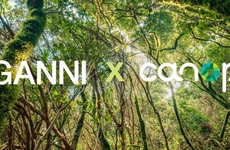
The Gap is Taking Strides with Its Sustainable Changes
Riley von Niessen — April 3, 2018 — Eco
The Gap has shared news that it will be taking on a new water conservation initiative, which will help it to reach its goal of saving ten billion liters of water by the time 2020 comes to an end. The 10 billion liters saved by the company would be enough to provide daily drinking water for five billion people, Teen Vogue reports.
Christophe Rousse, Executive VP of Global Sourcing for the Gap, explained the water conservation initiative by saying, "Leveraging the power of product innovation and improved manufacturing practices, we can help ensure that our customers not only look great in their favorite jeans and T-shirts, but also feel good about how their purchases are helping to make a positive impact for communities and helping to tackle global water scarcity."
Image Credit: Getty Images
Christophe Rousse, Executive VP of Global Sourcing for the Gap, explained the water conservation initiative by saying, "Leveraging the power of product innovation and improved manufacturing practices, we can help ensure that our customers not only look great in their favorite jeans and T-shirts, but also feel good about how their purchases are helping to make a positive impact for communities and helping to tackle global water scarcity."
Image Credit: Getty Images
Trend Themes
1. Water Conservation Initiatives - Implementing innovative strategies and technologies to conserve water on a large scale can lead to significant environmental and social impact.
2. Sustainable Fashion - The fashion industry can embrace sustainable practices, such as water conservation, to minimize its environmental footprint and contribute to a greener future.
3. Corporate Social Responsibility - Companies can prioritize initiatives like water conservation as part of their commitment to social and environmental responsibility.
Industry Implications
1. Fashion Retail - Fashion retailers can adopt water conservation initiatives to promote sustainable practices and meet the growing demand for eco-friendly fashion.
2. Garment Manufacturing - By implementing more efficient manufacturing practices and investing in innovative technologies, garment manufacturers can significantly reduce water consumption.
3. Environmental Consulting - Environmental consulting firms can provide expertise and guidance to businesses in developing and implementing effective water conservation initiatives.
2.9
Score
Popularity
Activity
Freshness























